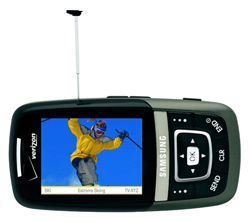| Рубрикатор |  |
 |
| Все новости |  |
World News |  |
 |
Dish may serve up mobile television service
| 24 марта 2008 |
Dish Network, the US direct broadcast satellite TV operator, could be considering launching a mobile television service to compete with the leading US mobile phone companies, according to industry analysts.
 The company, which has about 12.7m satellite TV customers, was a surprise bidder and big winner in the Federal Communications Commission’s auction of prime 700Mhz spectrum which ended last week with bids totalling $19.6bn.
The company, which has about 12.7m satellite TV customers, was a surprise bidder and big winner in the Federal Communications Commission’s auction of prime 700Mhz spectrum which ended last week with bids totalling $19.6bn.
While Verizon Wireless, the joint venture between Verizon Communications and Vodafone Group of the UK, and AT&T, the largest US telecoms group, spent most in the auction, Dish, through a company called Frontier Wireless, won nearly enough licences to create a nationwide footprint.
Dish spent $712m for licences in the so-called “E” block of spectrum which is ideal for video but does not allow for two-way services.
“We suspect Dish bid on E block spectrum to build a wireless video network, rather than a data or voice network [which requires two-way communications],” noted Jason Bazinet of Citigroup Global markets in a note to investors. “We were surprised Dish entered the auction and more surprised it emerged as a big winner.”
With the cable and satellite industry in the US maturing – roughly 80 per cent of US households have multi-channel TV services – analysts have suggested video customer adoption rates could slow, encouraging operators such as Dish to invest in wireless broadband services.
However, Mr Bazinet estimates that it could cost $3bn-$5bn to establish a nationwide mobile video service.
Dish’s auction success probably also reduces the chance that the company could be acquired by AT&T.
“This level of investment seems to signal that Dish plans to compete with the cable and telecoms companies on a standalone basis rather than sell to a rival,” Citigroup said.
Dish declined to comment on the auction results, or its plans.
Meanwhile, other analysts warned that the decision by Verizon Wireless to spend $9.36bn in the auctions may prove to have been a risky investment.
“Verizon spent $4.7bn on the national C block with open access restrictions, $2.6bn on A block that may have interference issues and $2.1bn on particularly expensive B block licences,” noted Jason Armstrong of Goldman Sachs.
Under the terms of the auction, Verizon must adopt “open access” provisions for the C block spectrum and allow any device, once tested, to run on the network.
By contrast, Mr Armstrong said that the other big auction winner, AT&T, spent roughly $9.1bn in the auction for spectrum that has “fewer requirements and lower potential for interference”.
AT&T’s mobile unit is expected to use the spectrum it acquired in the auction to roll out a next generation 4G network based on LTE (long- term evolution) technology beginning in 2010.
Источник: Financial Times
















Оставить свой комментарий:
Комментарии по материалу
Данный материал еще не комментировался.